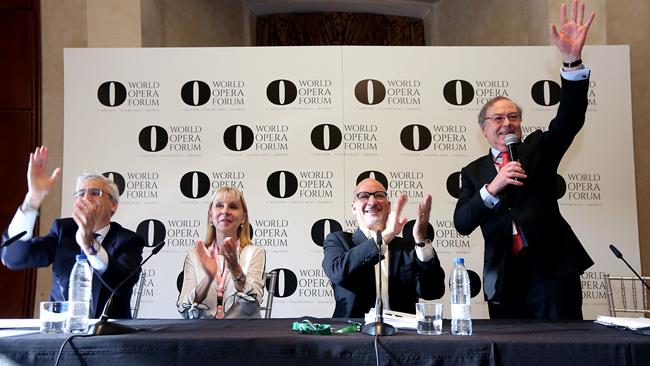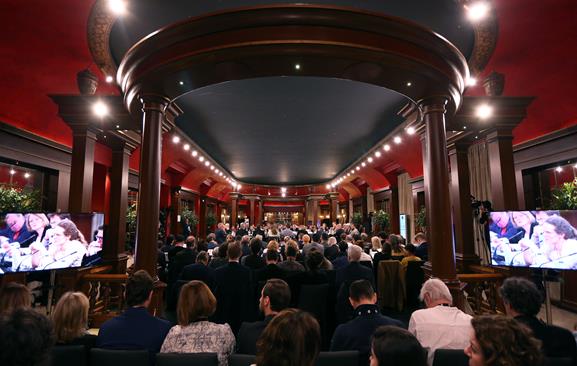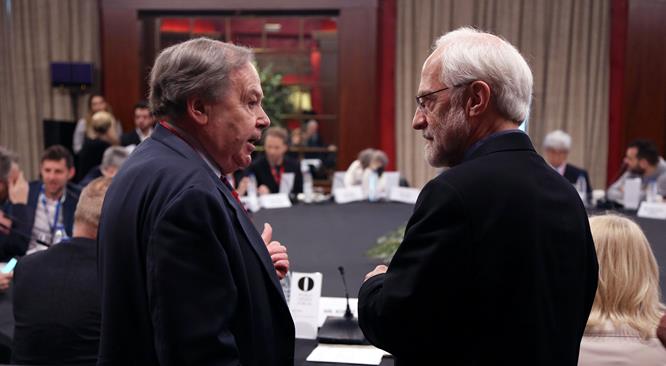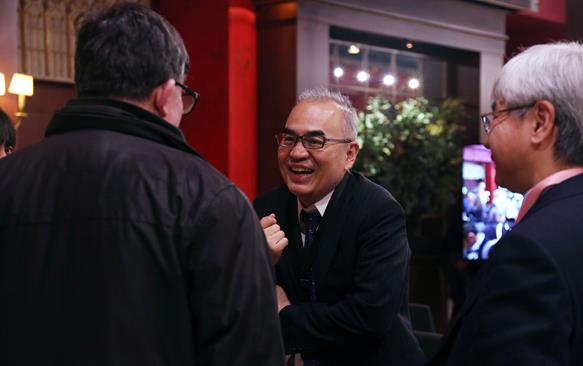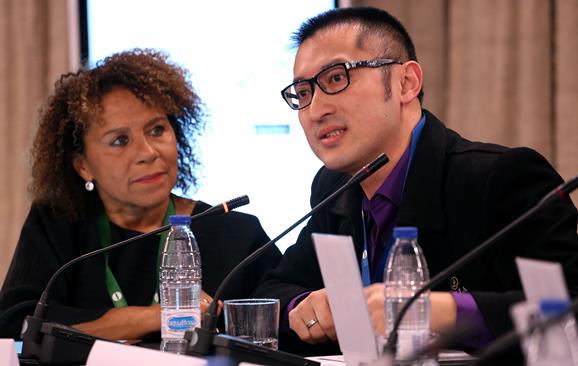World Opera Forum 2024 | June 3-5
The second-ever World Opera Forum welcomes opera leaders from around the world to Los Angeles for a global conversation about the future of the art form.
Directly preceding Opera Conference 2024, the forum will engage opera leaders from six continents in discussion of the strategies needed to guide the sector through today’s dynamic landscape of art, politics, and technology.
The forum is hosted by OPERA America in collaboration with Opera Europa, Ópera Latinoamérica, and the Association for Opera in Canada.
Forum Topics
Opera has benefitted for decades from the support of cultural agencies and philanthropy. But in a world of competing priorities and limited resources, support structures are weakening. Making a case for opera requires new organizational and artistic strategies.
Over three days, delegates and members from the global opera community are invited to investigate the following key themes:
Introduction: Making a Case for Opera in the 21st Century
Opera has benefitted for decades from the support of cultural agencies and private philanthropists for different reasons. In much of Europe, governments have been motivated by a sense of obligation to their national culture and cultural infrastructure. In North America, the grandeur and exclusivity of opera has been an allure to many social and business leaders. Many countries exhibit a mix of these motivations, but in a world of competing priorities and limited resources, support structures for opera companies in their current form are weakening.
Making a case for opera today cannot be a simple narrative exercise in which different language is found to change the public perception and value of the art form. Superficial changes will not be sufficient to overcome barriers to opera participation. Making a case for opera requires new organizational and artistic strategies that make theaters welcoming to more diverse audiences and convey the importance of the arts, artists, and arts workers to healthy communities and thriving economies.
What is the government’s responsibility to support the arts in a world that is becoming increasingly multicultural? Are commitments to overcome the elitism of opera and increase diversity authentic and sustained? Is the tempo of evolution too slow; is disruption a necessary precursor to reinvention?
Featuring:
- Laura Berman, intendantin, Staatsoper Hannover
- Laura Canning, general director & CEO, Opera North
- James Darrah, artistic director and chief creative officer, Long Beach Opera
- Flavia Furtado, executive director, AMAZONAS OPERA FESTIVAL - FAO
- Galyna Grygorenko, head/composer, The State Agency of Ukraine Arts and Art Education
- Bibian Kalinde, president, Pan African Society for Musical Arts Education (PASMAE)
- Missy Mazzoli, composer; professor, Bard College Conservatory; co-founder Luna Composition Lab
- Magdalene Minnaar, artistic director, Cape Town Opera
- Michael Hidetoshi Mori, general director, Tapestry Opera
- Julia Noulin-Mérat, general director and CEO, Opera Columbus
- Morris Robinson, bass
- Mark Taylor, executive director, State Opera South Australia
- Facilitator: Ed Yim, senior vice president and chief content officer, WQXR
Topic I: What We Produce, How We Produce It, and For Whom
Through the 20th century and into the 21st, opera has been defined by a 19th-century European repertoire that extended Europe’s cultural sensibilities around the world, including some works that promote cultural stereotyping and depict the mistreatment of women. Some of these works have enduring musical importance but require careful consideration in light of contemporary sensibilities.
At the same time, an increasing number of new works tell new stories in different styles that connect opera to life today. Composers and librettists entering the opera sphere are helping the art form evolve as a contemporary cultural expression. New collaborative, cooperative, and devised models of creation are expanding the creative diversity of the art form. Co-production among companies leverages resources and promotes sustainability. The incorporation of film, video, and other new technologies amplifies the scope of production design and composition. Technology also expands the reach of opera outside the walls of the opera house through live transmission, recordings, and work developed specifically for the screen.
Enlarging the palette of opera increases the potential to attract new audiences, and while most companies report record-setting first-time attendance, many newcomers are not yet returning frequently. Some long-standing audiences are unenthusiastic about new works and new interpretations of their favorite operas. Many people have incorporated new forms and formats of entertainment and cultural consumption into their lives, intensifying competition for their time and attention.
How can the intersection of the old and new enrich the entire opera experience? What is the right balance between stories with local impact and universal appeal? Can stewardship of the operatic inheritance and encouragement of new creation be woven into an appealing continuum? Should continuity be the goal, or is discontinuity the more appropriate path to progress?
Featuring:
- Afton Battle, VP, Lyric Unlimited; artistic operations, Lyric Opera of Chicago
- Renata Borowska-Juszczyńska, general manager, Poznań Opera House
- Aviel Cahn, general director, Grand Théâtre de Genève
- Jo Davies, artistic director, Opera Australia
- Andrea Fuentes, vice president, LA Opera Connects, LA Opera
- Rebecca Hass, director of community engagement, Pacific Opera Victoria
- Iva Hraste-Sočo, general manager and artisitc director, Croatian National Theatre in Zagreb
- Christopher Koelsch, president and CEO, LA Opera
- Ilaria Lanzino, director, Musiktheater an der Wien, Nurnberg Staatstheater, Oper Leipzig, Teatr Wielki Poznan, Aalto Theater, Staatstheater Wiesbaden
- Joan Matabosch, artistic director, Teatro Real Madrid
- Beth Morrison, president and creative producer, BMP; and founding co-director/ PROTOTYPE, Beth Morrison Projects, and Prototype Festival
- Matthew Ozawa, chief artistic administration officer, Lyric Opera of Chicago
- Pedro Salazar, director escénico, La Compañía Estable
- Facilitator: Ed Harsh, director of strategic initiatives, The Kurt Weill Foundation for Music
Topic II: Elevating Human Values
The worldwide pandemic shined the light on the urgency to reassess opera’s relationship with the people who bring the art form to life. Opera leaders have a history of inspiring audiences with transporting productions and virtuosic performances, but this success has taken place too often without sufficient regard for the well-being of the artists and artisans who make the work possible.
Opera leaders are called upon to examine and adjust long-standing policies and practices to retain and recruit staff in critical areas of operation and provide a responsible level of job security. The training of artists must prepare them to exercise agency in the progress of their own multifaceted careers. A sustained commitment to embrace new attitudes and values and create workplaces that affirm individual identities, promote social and racial justice, and assure safe and respectful work conditions is an essential basis for extending service to the public.
How can producers overcome inherited attitudes and adjust ingrained practices to improve conditions for artists and arts workers? How can artists be empowered as full partners in the opera enterprise? How can artists and arts workers thrive in the context of reduced productivity? Will changed values reshape the structure and operation of opera companies?
Featuring:
- Paolo Bortolameolli, music director, Orquesta Sinfónica Nacional Esperanza Azteca
- Deborah Brevoort, librettist and playwright
- Danny Chen, executive producer, Kuala Lumpur City Opera
- Joanne Cole, director, artistic planning and participation, New Zealand Opera
- Timothy Long, artistic and music director of opera, Eastman School of Music
- Sue Marineau, Board Chair, OPERA America; Board Chair, Santa Fe Opera; Trustee, San Francisco Opera
- Tim O'Leary, General Director, Washington National Opera
- Paolo Petrocelli, head, Dubai Opera
- Jean-Pierre Primiani, director of development, Opéra de Montréal
- Henning Ruhe, artistic director, Göteborgsoperan
- Yuval Sharon, director, founder and artistic co-director, The Industry (Los Angeles); artistic director, Detroit Opera
- Robin Whiffen, general director, Against the Grain Theatre
- Facilitator: Rebekah Diaz, director I.D.E.A. initiatives and community engagement, Pittsburgh Opera; president and founder, Diaz Inclusion Consulting
Topic III: Becoming Engaged Cultural Citizens
Opera cannot thrive without a demonstrable connection to the social and political dynamics of the communities that are home to companies. In an age defined by war and migration, climate change, cultural and economic inequities, political polarization, and increasing diversity, the mission of opera must expand beyond the narrow purview of the arts.
With a shared, multi-national repertoire, every opera company will be enriched by its unique relationship to its place and the qualities that shape it. Opera’s inherent capacity to convene, communicate, educate, and bridge divides must be shared broadly to improve the lives and lift the spirits of people who may never enter the opera house in addition to those who enjoy the art form.
How can the demands of producing opera be integrated into a larger commitment to addressing varied and changing civic priorities? Can the aesthetics of public service be appreciated equally with the aesthetics of production and performance? Do expanded civic responsibilities require changes in organizational missions?
Featuring:
- Jan Henric Bogen, general and artistic director, Konzert und Theater St. Gallen
- Andrea Caruso Saturnino, general director, Theatro Municipal de São Paulo
- Antonio Cuyler, professor of music in entrepreneurship and leadership, University of Michigan; consultant, Cuyler Consulting, LLC
- Khori Dastoor, general director & CEO, Houston Grand Opera
- Larry Desrochers, general director & CEO, Manitoba Opera
- Hannah Griffiths, general manager, Birmingham Opera Company
- Asad Lalljee, curator, Royal Opera House of Mumbai
- Carmen Gloria Larenas, general director, Teatro Municipal de Santiago
- Gabriela Lena Frank, pianist and composer
- Javier Menendez, director general,Teatro de la Maestranza
- Barbara Minghetti, artistic director, Teatro Sociale Como, Teatro Regio Parma
- Phenye Modiane, founder and managing director, Johannesburg Opera
- Sebastian Schwarz, artisitc director, Festival Della Valle D'Itria
- Facilitator: Susan Feder, program officer, Arts and Culture, Andrew W. Mellon Foundation
Conclusion: Making a Case for Opera
We return to the opening challenge. Have two days of debate about critical issues among global opera leaders clarified programmatic aspirations, prioritization of respect for the people of opera, and the relationship of companies to the places they inhabit? Can creative sustainability, environmental sustainability, and financial sustainability coexist in a supportable balance? Can they reinforce one another in a manner that brings new energy to a 400-year-old art form?
Featuring:
- Christopher Koelsch, president and CEO, LA Opera
- Marc A. Scorca, president and CEO, OPERA America
View the full schedule here.
Forum Structure
Over fifty official delegates, including artists, administrators, trustees, and advocates from six continents, have been chosen by an international committee to lead the forum discussions. Delegates will engage with each of the three topics in a half-day sequence that includes opening remarks, a moderated "fishbowl" debate, break-out groups, and a concluding summary.
All members of OPERA America, Opera Europa, and Ópera Latinoamérica are invited to register for the forum as participants at large. They will be able to participate in all sessions and enrich discussion by submitting questions and comments. And they will extend the ideas of the forum to the subsequent Opera Conference and their home companies.
The combined World Opera Forum and Opera Conference will be a week filled with debate, discussion, and networking at the conclusion of which participants will leave with new insights, ideas, and relationships that circle the globe.
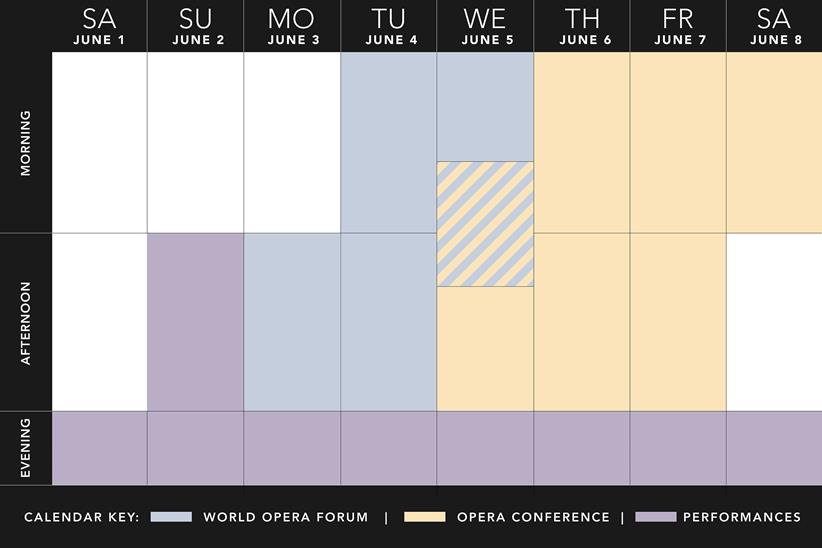
Forum Delegates
The World Opera Forum features delegates from all six continents.
Explore the list of artists, administrators, trustees, and advocates who will engage in the global discussion in Los Angeles:
Argentina
- Jorge Telerman, general director, Teatro Colón
Australia
- Jo Davies, artistic director, Opera Australia
- Mark Taylor, executive director, State Opera South Australia
Brazil
- Flavia Furtado, executive director, Amazonas Opera Festival
- Andrea Caruso Saturnino, general director, Theatro Municipal de São Paulo
Canada
- Larry Desrochers, general director and CEO, Manitoba Opera
- Rebecca Hass, director of engagement programs and partnerships, Pacific Opera Victoria
- Michael Hidetoshi Mori, artistic and general director, Tapestry Opera
- Jean-Pierre Primiani, director of development, Opéra de Montréal
- Robin Whiffen, executive director, Against the Grain Theatre
Chile
- Paolo Bortolameolli, music director, Orquesta Sinfónica Nacional Esperanza Azteca
- Carmen Gloria Larenas, general director, Teatro Municipal de Santiago
Colombia
- Pedro Salazar, stage director, La Compañía Estable
Croatia
- Iva Hraste-Sočo, general manager and artistic director, Croatian National Theatre in Zagreb
France
- Louis Langrée, conductor, general director, Théâtre national de l'Opéra-Comique
Germany
- Laura Berman, intendant, Staatsoper Hannover
India
- Asad Lalljee, curator, Royal Opera House Mumbai
Italy
- Ilaria Lanzino, director, librettist
- Barbara Minghetti, artistic director, Teatro Sociale di Como, Teatro Regio di Parma
- Sebastian F. Schwarz, artistic director, Festival della Valle d'Itria
Japan
- Reiko Ishikawa, senior artistic administrator of opera, New National Theater Tokyo
- Masami Zeniya, president, New National Theatre Tokyo
Malaysia
- Danny Chen, executive producer, Kuala Lumpur City Opera
New Zealand
-
Joanne Cole, director, artistic planning and participation, New Zealand Opera
Poland
- Renata Borowska-Juszczyńska, general director, Grand Theatre, Poznań
South Africa
- Magdalene Minnaar, artistic director, Cape Town Opera
South Korea
- Kounee Suh, general director, Seoul Arts Center
Spain
- Joan Matabosch, artistic director, Teatro Real
- Javier Menéndez, director general, Teatro de la Maestranza
Sweden
- Henning Ruhe, artistic director, GöteborgsOperan
Switzerland
- Aviel Cahn, general manager, Grand Théâtre de Genève
- Jan Henric Bogen, general and artistic director, Konzert und Theater St. Gallen
Ukraine
- Galyna Grygorenko, composer, The State Agency of Ukraine Arts and Art Education
United Arab Emirates
- Paolo Petrocelli, head, Dubai Opera
United Kingdom
- Laura Canning, general director and CEO, Opera North
- Elena Langer, composer
United States
- Afton Battle, vice president, Lyric Unlimited; artistic operations, Lyric Opera of Chicago
- Deborah Brevoort, librettist
- Antonio Cuyler, professor of music in entrepreneurship and leadership, University of Michigan; consultant, Cuyler Consulting LLC
- James Darrah, artistic director and chief creative officer, Long Beach Opera
- Khori Dastoor, general director and CEO, Houston Grand Opera
- Gabriela Lena Frank, pianist and composer
- Andréa Fuentes, Ed.D., Vice President, LA Opera
- Christopher Koelsch, president and CEO, LA Opera
- Timothy Long, artistic and music director of opera, Eastman School of Music
- Susan G. Marineau, board chair, OPERA America; board chair, The Santa Fe Opera; trustee, San Francisco Opera Board
- Missy Mazzoli, composer; professor, Bard College Conservatory; co-founder, Luna Composition Lab
- Beth Morrison, president and creative producer, Beth Morrison Projects; founding co-director, PROTOTYPE Festival
- Julia Noulin-Mérat, general director and CEO, Opera Columbus
- Timothy O’Leary, general director, Washington National Opera
- Matthew Ozawa, chief artistic administration officer, Lyric Opera of Chicago
- Morris Robinson, bass
- Yuval Sharon, director; founder and artistic co-director, The Industry; artistic director, Detroit Opera
Zambia
- Bibian Kalinde, president, Pan African Society for Musical Arts Education
Building on the 2018 Forum
The 2024 World Opera Forum builds on the inaugural forum hosted by the Teatro Real in Madrid in 2018.
Since then, the world has been changed by a global pandemic. Inherited cultural traditions are being reexamined, social and environmental justice is taking precedence among other priorities, government policies are shifting, and technology is reshaping our relationships with one another, our audiences, and the public.
Yet, within this ever-changing landscape, opera retains its unique power as a story-based, multimedia art form that can strengthen community ties, address civic issues, and inspire audiences across economic, social, and racial divides.
